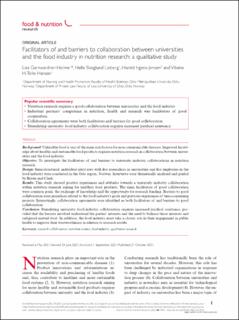Facilitators of and barriers to collaboration between universities and the food industry in nutrition research: a qualitative study
Peer reviewed, Journal article
Published version
Permanent lenke
https://hdl.handle.net/11250/2993955Utgivelsesdato
2021-10-27Metadata
Vis full innførselSamlinger
Sammendrag
Background: Unhealthy food is one of the main risk factors for non-communicable diseases. Improved knowledge about healthy and sustainable food products requires nutrition research in collaboration between universities and the food industry.
Objective: To investigate the facilitators of and barriers to university–industry collaborations in nutrition research.
Design: Semi-structured, individual interviews with five researchers in universities and five employees in the food industry were conducted in the Oslo region, Norway. Interviews were thematically analysed and guided by Braun and Clark.
Results: This study showed positive experiences and attitudes towards a university–industry collaboration within nutrition research aiming for healthier food products. The main facilitators of good collaboration were common goals, the exchange of knowledge and the opportunity for research funding. Barriers to good collaboration were prejudices related to the food industry’s goals and previous experiences of time-consuming projects. Interestingly, collaboration agreements were identified as both facilitators of and barriers to good collaboration.
Conclusion: Stimulating university–food industry collaboration requires increased juridical assistance, provided that the lawyers involved understand the parties’ interests and the need to balance those interests and safeguard mutual trust. In addition, the food industry must take a clearer role in their engagement in public health to improve their trustworthiness in relation to research results.

